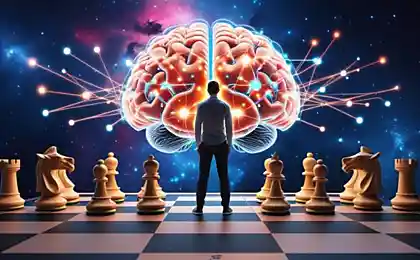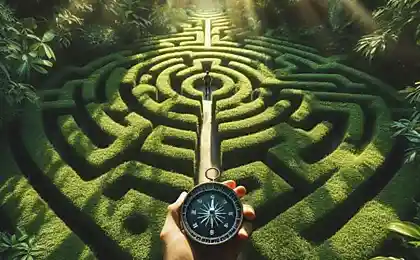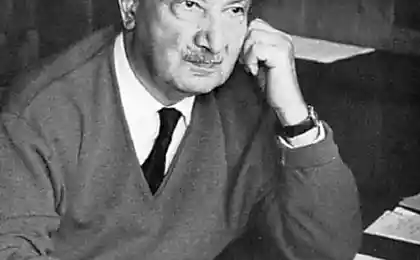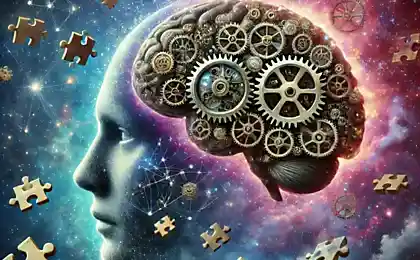411
Prison of the mind: 5 not so obvious facts about thinking
Ninety two million seven hundred twenty two thousand nine hundred ninety three
© Dan Saelinger
It turns out that our mind is not always useful to us. Reflection, thinking about the unfair world and meaningless Association game saps the strength and distract attention from what surrounds us. The author of the blog Raptitude, David Cain wrote on a limited budget of attention and constant internal "mapping" of our experience.
People are talking about thinking. We are constantly talking about what we think but rarely talk about the process. But thinking is a huge part of our lives is probably the most significant a part of our experience.
Thinking affects everything in life: your actions, your ideas about yourself, your capabilities, your stress level and your health. Your way of thinking determines what kind of experience will prevail in your life: whether it's fear or admiration, whether it is excessive or insufficient.
My life has become a hell of a lot better since then, as I started to pay attention to the role that play in my mind. There was a time when I would have doubted the truth of the five following statements, but now I consider them an essential truth of life.
We are thinking almost all the time
Little children are great observers. Most of the time their attention is occupied by what they see and hear. They can definitely think and reflect, but the immediate sensory world seems to them more important. It's not uncommon to see an adult, lost in thought and not noticing anything around, but it's weird to see a toddler with the same glassy, absent look.
With maturity of thought comes to the fore of our experience. Even when we pay attention to the sensory world, we continually interpret, predict and evaluate. When the children get older, they devote more and more attention to their own internal mapping, it becomes more important than the momentary fresh observation.
Imagine tourists, wandering with a map in front of him. They see the landmarks of the real world, but use them only as a reference to determine its place on the map and building a route to another point. Most adults interact with the world also, out of habit: the content of our thoughts and impressions are the main landscape, and momentary sensory experience is secondary.
Most of our thoughts actually lead nowhere
We need to think that our mind is capable of amazing things. But most thoughts don't lead to any solution or insight which would be applicable in the real world. We just raised whirlwinds of dust. One thought always leads to another, but to monitor their progress — it's like picking randomly growing flowers, and not to go on the trail deliberately scattered bread crumbs.
If you take the habit to ask yourself what exactly you want to achieve, thinking about something at some point, you may find that you do not find the answer. What a good idea, is she not pushing for any decision made or action? Of course, thinking there are other goals — for example, to distract oneself from more distressing thoughts or to indulge in fantasies. But in this case, the real world comes to an end. Most often these thoughts are not intentions, and not particularly useful.
For the most part, thinking is merely unconscious associationvoice, tiring and absorbing our attention. It is habitual busywork of the mind, able to gobble up so much of your attention as you can until you disconnect it from the power supply.
Thinking is addictive
Who cares about the name of the actor who played mediocre in the sitcom of the 80s, the musical theme played in my head in the morning? My mind why that is the case. If I hadn't intervened, we would have to postpone his entire rest of life in order to resolve this issue.
The reason happy to get any job, even if it has no foreseeable benefit. Just like a sales agent who will sell you any thing until you stop buying them, your mind tends to work in while you can. He really likes to put, to compare and to invent.
We can all agree that it's great that the mind is capable of these things. But in order to do them, it requires your attention, which is not much. If the mind knew that he would have to work with a budget, it would have been more sensible regarding projects for which taken.
We adults are so used to this constant mental activity that, when it stops, we have a strange feeling. For the same reason it is difficult to break away from an unplanned Netflix marathon. Not necessarily in that TV show you are watching, so good. The fact that it is easier for you to continue to watch, not to decide what to do instead.
We often confuse our thoughts with their subject
We've all been overwhelmed with the thought that he would lose the thread of what is happening. You can fully master your old relationship, or schedule in your office on the other side of town, or a future where there will be no more fish in the ocean, and you'll hardly notice sitting in the bathroom in 4 hours of the Sabbath day.
Your emotions in these cases it is better correspond to what is contained in your head, but not what is happening around. This is because all thoughts exist in the present — even thoughts about absent people or events. So when you think about something that upsets you, you actually respond to the idea, but not its subject. Obviously, it's not your ex-girlfriend forces you to sit in the bathroom and sad, it's your thought about this man and this time. It is not there. At all. There is only thought.
Your body is constantly led by the nose. Only have time to think about a bowl of French fries as the salivary glands are already starting in your mouth party, not knowing that there are no potatoes. Or just think about sex and genitals immediately begins to rebuild by moving fluid back and forth and getting ready to greet the guest, don't come. If you'll indulge the delusions of your body it can even try to have a baby.
When you're in bed and can't sleep because of political violence, it's not an imperfect world does not allow you to fall asleep. It is a thought that you have in this moment, right here, in your bedroom. Why else would the "world" didn't bother you since your birth? We can only respond to what is in the present.
We have less to live inside my head
I'm not trying to demonize the idea. Thoughts are absolutely necessary for our functioning. But the ratio of net signal to noise will stun you, if you take the habit from time to time to pay attention to it. Knowing that most of our thoughts really does not serve us, we can understand how to regain our attention and to draw him on what is happening in the moment.
Your focus is either on your thoughts or in the rest of the place, the sensory world of images, sounds, smells, sensations and tastes. It more just nowhere to be. So reducing life lived inside the head equivalent to the increase of life lived in the physical world. Sometimes the world around is so beautiful that distracts our attention from the thoughts, but the rest of the time you need to send it manually.
Doing this isn't particularly difficult — it's hard to remember that it is necessary. Management attention should become a habit, because we adults know how to Live In your Head, without Even Noticing it, better than doing anything else.
Source: theoryandpractice.ru
© Dan Saelinger
It turns out that our mind is not always useful to us. Reflection, thinking about the unfair world and meaningless Association game saps the strength and distract attention from what surrounds us. The author of the blog Raptitude, David Cain wrote on a limited budget of attention and constant internal "mapping" of our experience.
People are talking about thinking. We are constantly talking about what we think but rarely talk about the process. But thinking is a huge part of our lives is probably the most significant a part of our experience.
Thinking affects everything in life: your actions, your ideas about yourself, your capabilities, your stress level and your health. Your way of thinking determines what kind of experience will prevail in your life: whether it's fear or admiration, whether it is excessive or insufficient.
My life has become a hell of a lot better since then, as I started to pay attention to the role that play in my mind. There was a time when I would have doubted the truth of the five following statements, but now I consider them an essential truth of life.
We are thinking almost all the time
Little children are great observers. Most of the time their attention is occupied by what they see and hear. They can definitely think and reflect, but the immediate sensory world seems to them more important. It's not uncommon to see an adult, lost in thought and not noticing anything around, but it's weird to see a toddler with the same glassy, absent look.
With maturity of thought comes to the fore of our experience. Even when we pay attention to the sensory world, we continually interpret, predict and evaluate. When the children get older, they devote more and more attention to their own internal mapping, it becomes more important than the momentary fresh observation.
Imagine tourists, wandering with a map in front of him. They see the landmarks of the real world, but use them only as a reference to determine its place on the map and building a route to another point. Most adults interact with the world also, out of habit: the content of our thoughts and impressions are the main landscape, and momentary sensory experience is secondary.
Most of our thoughts actually lead nowhere
We need to think that our mind is capable of amazing things. But most thoughts don't lead to any solution or insight which would be applicable in the real world. We just raised whirlwinds of dust. One thought always leads to another, but to monitor their progress — it's like picking randomly growing flowers, and not to go on the trail deliberately scattered bread crumbs.
If you take the habit to ask yourself what exactly you want to achieve, thinking about something at some point, you may find that you do not find the answer. What a good idea, is she not pushing for any decision made or action? Of course, thinking there are other goals — for example, to distract oneself from more distressing thoughts or to indulge in fantasies. But in this case, the real world comes to an end. Most often these thoughts are not intentions, and not particularly useful.
For the most part, thinking is merely unconscious associationvoice, tiring and absorbing our attention. It is habitual busywork of the mind, able to gobble up so much of your attention as you can until you disconnect it from the power supply.
Thinking is addictive
Who cares about the name of the actor who played mediocre in the sitcom of the 80s, the musical theme played in my head in the morning? My mind why that is the case. If I hadn't intervened, we would have to postpone his entire rest of life in order to resolve this issue.
The reason happy to get any job, even if it has no foreseeable benefit. Just like a sales agent who will sell you any thing until you stop buying them, your mind tends to work in while you can. He really likes to put, to compare and to invent.
We can all agree that it's great that the mind is capable of these things. But in order to do them, it requires your attention, which is not much. If the mind knew that he would have to work with a budget, it would have been more sensible regarding projects for which taken.
We adults are so used to this constant mental activity that, when it stops, we have a strange feeling. For the same reason it is difficult to break away from an unplanned Netflix marathon. Not necessarily in that TV show you are watching, so good. The fact that it is easier for you to continue to watch, not to decide what to do instead.
We often confuse our thoughts with their subject
We've all been overwhelmed with the thought that he would lose the thread of what is happening. You can fully master your old relationship, or schedule in your office on the other side of town, or a future where there will be no more fish in the ocean, and you'll hardly notice sitting in the bathroom in 4 hours of the Sabbath day.
Your emotions in these cases it is better correspond to what is contained in your head, but not what is happening around. This is because all thoughts exist in the present — even thoughts about absent people or events. So when you think about something that upsets you, you actually respond to the idea, but not its subject. Obviously, it's not your ex-girlfriend forces you to sit in the bathroom and sad, it's your thought about this man and this time. It is not there. At all. There is only thought.
Your body is constantly led by the nose. Only have time to think about a bowl of French fries as the salivary glands are already starting in your mouth party, not knowing that there are no potatoes. Or just think about sex and genitals immediately begins to rebuild by moving fluid back and forth and getting ready to greet the guest, don't come. If you'll indulge the delusions of your body it can even try to have a baby.
When you're in bed and can't sleep because of political violence, it's not an imperfect world does not allow you to fall asleep. It is a thought that you have in this moment, right here, in your bedroom. Why else would the "world" didn't bother you since your birth? We can only respond to what is in the present.
We have less to live inside my head
I'm not trying to demonize the idea. Thoughts are absolutely necessary for our functioning. But the ratio of net signal to noise will stun you, if you take the habit from time to time to pay attention to it. Knowing that most of our thoughts really does not serve us, we can understand how to regain our attention and to draw him on what is happening in the moment.
Your focus is either on your thoughts or in the rest of the place, the sensory world of images, sounds, smells, sensations and tastes. It more just nowhere to be. So reducing life lived inside the head equivalent to the increase of life lived in the physical world. Sometimes the world around is so beautiful that distracts our attention from the thoughts, but the rest of the time you need to send it manually.
Doing this isn't particularly difficult — it's hard to remember that it is necessary. Management attention should become a habit, because we adults know how to Live In your Head, without Even Noticing it, better than doing anything else.
Source: theoryandpractice.ru























